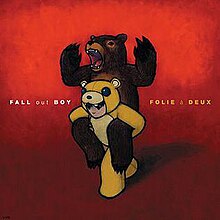Folie à Deux (album)
| Folie à Deux | ||||
|---|---|---|---|---|
 |
||||
| Studio album by Fall Out Boy | ||||
| Released | December 16, 2008 (US) | |||
| Recorded | July – September 2008 | |||
| Studio | The Pass Studios and The Casita in Hollywood, California | |||
| Genre | ||||
| Length |
|
|||
| Label | Island B0012196-02 | |||
| Producer | ||||
| Fall Out Boy chronology | ||||
|
||||
| Singles from Folie à Deux | ||||
|
||||
| Professional ratings | |
|---|---|
| Aggregate scores | |
| Source | Rating |
| Metacritic | 73/100 |
| Review scores | |
| Source | Rating |
| AllMusic | |
| The A.V. Club | A |
| Entertainment Weekly | B |
| The Guardian | |
| Los Angeles Times | |
| MSN Music | B− |
| NME | 8/10 |
| The Observer | |
| Rolling Stone | |
| Spin | |
Folie à Deux (/fɒˈliː ə ˈduː/; French for "A Madness Shared by Two") is the fourth studio album by American rock band Fall Out Boy. Produced by Neal Avron, the album was recorded from July to September 2008 at The Pass Studios and The Casita in Hollywood, California. As the follow-up to the band's commercially successful 2007 effort Infinity on High, it was released by Island Records on December 16, 2008, after the original November 4 release was postponed to avoid conflicts with the United States presidential election. Like the band's two previous releases, Folie à Deux was musically composed by lead vocalist and guitarist Patrick Stump, with lyrics penned by bassist Pete Wentz. In regard to the writing process, the band considered Folie à Deux to be the band's most collaborative record at the time.
The album was recorded in relative secrecy compared to the press that its predecessor possessed. The recording sessions inspired lyricism that related to decaying relationships, moral dilemmas, and societal shortcomings, many with a political edge. It is the first Fall Out Boy album with lyrics that are less autobiographical. The album's style moved away from early emo power chords and toward a wider variation in genre. Fall Out Boy recruited several guest artists for Folie à Deux, as well as employing instruments and recording techniques previously unfamiliar to the group. To promote the album, the band launched a viral campaign based around a Big Brother-type organization named "Citizens For Our Betterment" (CFOB) and embarked on an extensive tour schedule.
...
Wikipedia
